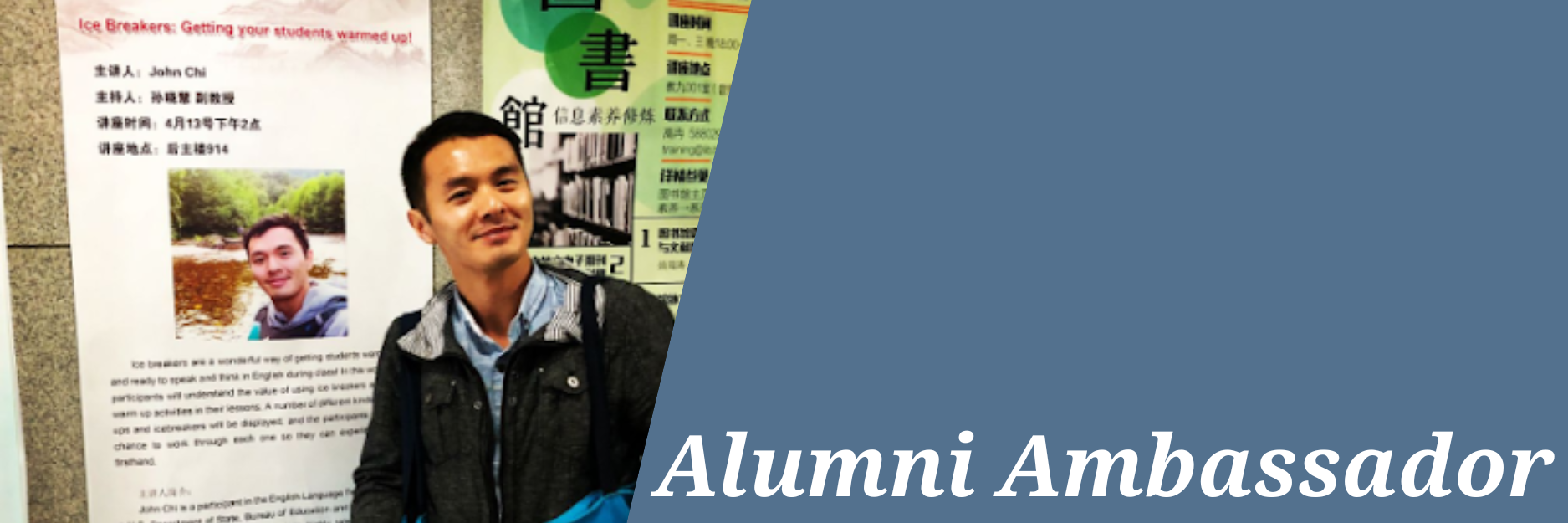“Through my fellowship experience in China, I discovered that my passion is working with pre- and in-service teachers, and promoting humanizing pedagogy in ELT,” said Alumni Ambassador John Chi, who was an English Language Fellow in China, 2017-2019. “As an ethnically Chinese teacher and a speaker of Cantonese teaching English in China, I felt that race, identity, and language learning were at the forefront of my interpersonal and teaching experiences in ways that I hadn’t realized before,” Chi explained. “I became interested in the ways that personal heritage and language learning and teaching intersect.”
This experience inspired Chi to pursue a PhD in Applied Linguistics and Language Education at the University of Maryland, and shaped his research on TESOL teacher identity and working with multilingual and multicultural ESL/EFL teachers and students. “On top of the personal identity-related discoveries that I made during my time in China, my project also helped me understand the importance of balance, which I take with me every day as a PhD student and a researcher,” Chi said.
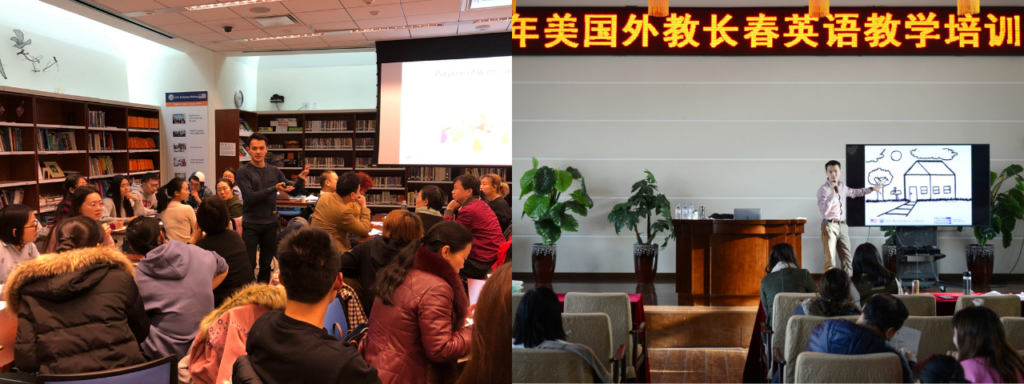
Facilitating his weekly roundtable discussion group at the Beijing American Center (left); leading a teacher training seminar for English language teachers in Changchun, China (right)
For his primary fellowship duties, Chi taught English and language teaching methods at Hebei Normal University of Science and Technology (HNUST) in Qinhuangdao, and then at Beijing Normal University (BNU) for his second year. His secondary duties involved traveling to different provinces to conduct language teaching workshops and teacher training seminars.
For a teacher training seminar in Changchun, Chi led workshops for over two hundred local K-12 teachers on performance assessment, focusing on developing and implementing tasks and rubrics. In collaboration with Fellow Shushan Richardson, Chi held weekly series of roundtable discussions for English language educators at the Beijing American Center.Their discussion topics included American English Live webinars, warm-ups and icebreakers, and, a personal passion, a session on rock climbing in the U.S. “I really appreciated how committed and enthusiastic the teachers were in our roundtable discussions,” Chi said. “Some of them took ten-hour train trips to Beijing to join us and work on improving as English teachers.”
Chi himself thrived on travel as a Fellow. In his first year alone, he took fifty-six train trips to various towns and cities across the country for teacher training workshops. “Any opportunity I had to work in another province I jumped on it because I wanted to explore and meet new teachers and students,” Chi said. The endless variety of regional foods provided further incentive for his love of travel. “In China, I did not experience any homesickness because I was too busy eating my way across the country,” Chi reflected. “As someone who grew up in an Asian household in a very diverse city in California, I was very comfortable eating all of the local foods from various regions—all the rice, noodles, and spices!”
Rock climbing at ‘Mirror Wall’ on a visit to his aunt’s hometown of Liuzhou in Guangxi province (left); snowboarding in the mountains north of Beijing (right)
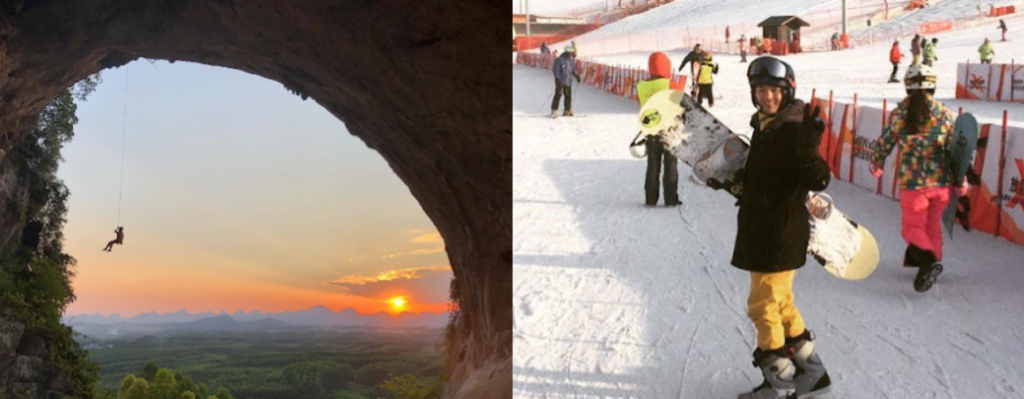
Another factor that helped Chi adapt to his life in China was the close relationships he formed with his Fellow colleagues. “Having this very close-knit cohort of Fellows in China and Mongolia made a huge impact on our lives,” Chi said. “We were able to spend time together and share our experiences. It was a pleasure to travel to other Fellows’ provinces to do workshops and see their host cities at the same time.”
His relationships with local colleagues and students provided him with another perspective. As the only Asian American among his cohort of Fellows in China and Mongolia, Chi found that he had a unique and challenging experience. “In China, I was not seen as a ‘foreigner’ except when it came to paperwork, and this meant that my local colleagues at my host institutions often assumed I understood cultural events and activities and they wouldn’t always invite me to things that the rest of my American colleagues got invited to,” Chi said. “Through this experience, I learned how to navigate a foreign country where I looked like the local population, and this had a lot of impact on my perspectives on the value of diversity and the complexity of identity.”
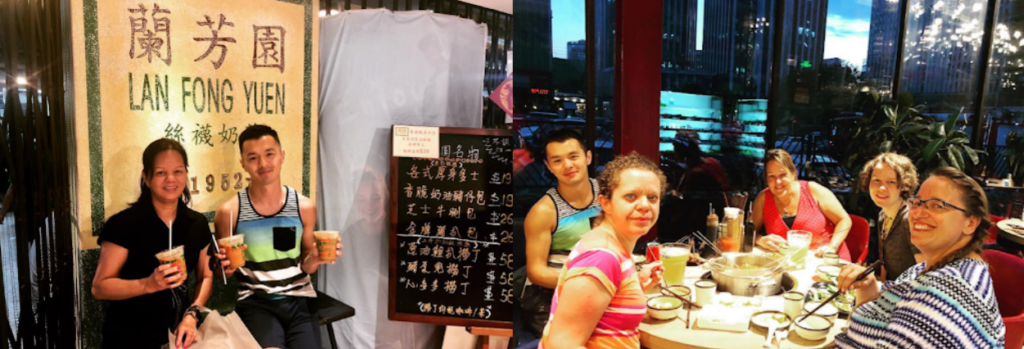
Chi and his mom at his favorite milk tea shop in Hong Kong (left); eating hot pot in Beijing with regional Fellows (right)
Currently, Chi teaches undergraduate- and graduate-level teacher education courses at the University of Maryland. His main focus is working with K-12 teacher candidates to examine their language ideologies about culturally and linguistically diverse student populations, and teaching them about language variation and multilingualism. He also worked as the editorial assistant for the International Multilingual Research Journal from 2021 to 2024, serving as the primary contact between the publishers, associate editors, and authors.
As his research deepens, Chi has become prolific in publishing, writing, and collaborating with experts on several articles, including Bilingual-Bicultural Education: Opportunity obscured; Bilingual-Bicultural Education rejected: English-only despite Lau. Language Policy; and the book chapter ‘Challenging standard language ideologies and promoting critical language awareness in teacher education’ in International Perspectives on Critical English Language Teacher Education.
By taking advantage of the English Language Programs Conference Grant opportunity to share work from his projects, Chi has presented at numerous national conferences including TESOL International, AAAL, and the National Council of Teachers of English (NCTE), on topics such as ‘Centering Identity as Pedagogy in Teacher Education’ and ‘Humanizing pedagogy in the EFL context: Interviews with EFL teacher educators.’
Chi with 2022-2023 Alumni Ambassador Natasha Agrawal at the 2024 NJEA conference in Atlantic City, New Jersey (left); reconnecting with colleagues from Beijing at the 2023 TESOL International Convention in Portland, Oregon (right)
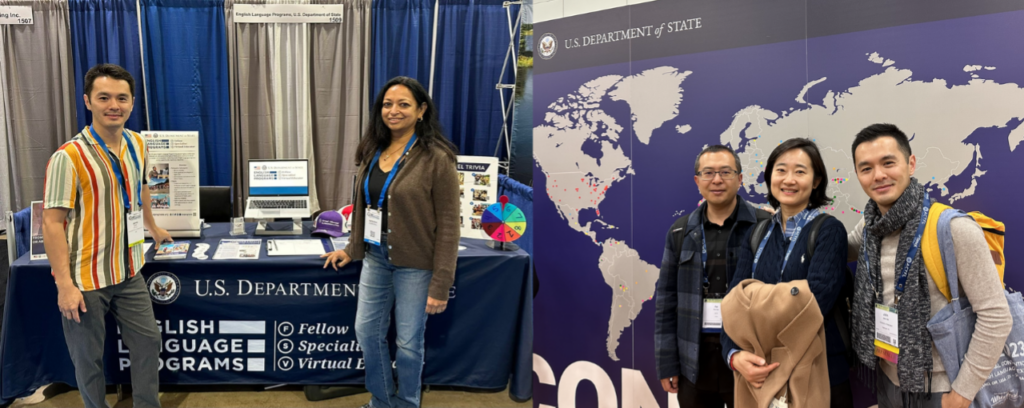
As Chi works on finishing his dissertation on ‘Sustainability and Investment in the Community: A Collaborative Evaluation of a Cantonese Heritage Language School,’ he is applying for tenure-track academic positions, keen to continue working “hands-on with educators and learners and examining language education from a critical perspective.”
I realize that not many people get the chance to live in another country and be immersed in its culture and daily life. I will always be grateful for having had that opportunity.
While Chi loves sharing how his work as a Fellow helped him explore his passions and guide his career, he’s found that it’s the sheer adventure and mystery of living abroad that he enjoys sharing the most. “Often when I meet people and share my experiences as a teacher educator in China and what my life was like living there for two years, I realize that not many people get the chance to live in another country and be immersed in its culture and daily life,” Chi said. “I will always be grateful for having had that opportunity.”
Stay tuned for our next featured Alumni Ambassador story with Quanisha Charles.

